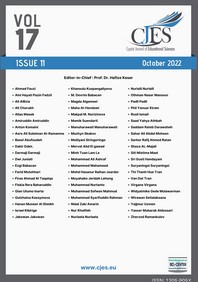Investigating the moderating effects of perceived usefulness on the student satisfaction: Evidence from Indonesian higher education
Investigating the moderating effects of perceived usefulness on the student satisfaction: Evidence from Indonesian higher education
Author(s): Nur Kholifah, Muhammad Nurtanto, Khansulu Kuspangaliyeva, Farid Mutohhari, Alias Masek, Gulzhaina KassymovaSubject(s): Higher Education , ICT Information and Communications Technologies, Distance learning / e-learning, Pedagogy
Published by: Birlesik Dunya Yenilik Arastirma ve Yayincilik Merkezi
Keywords: e-learning perspective; student satisfaction; motivation; e-learning readiness; higher education;
Summary/Abstract: This study examines technological competence, e-learning readiness and motivation that affect student user satisfaction. In addition, the involvement of perceived usefulness is a moderator of student user satisfaction. A total of 1217 students of engineering in the province of Yogyakarta, Indonesia, filled out the instrument. Data collection is done online through E-Monev, integrated with AIS with a Likert scale of five, and tested for validity and reliability. Data were analyzed using the path analysis method and bootstrapping with the PLS-SEM application. The results of the study respondents that technological competence, e-learning readiness, and motivation have a significant effect on user-student satisfaction. Furthermore, e-learning readiness moderated by perceived usefulness has a significant effect. This finding confirms that it is important for higher education to ensure that user students master technology competence and motivation in a balanced way. In the future, e-learning and hybrid learning that has taken place must be balanced with mastery of basic skills, namely technological competence and motivation through various pieces of training and direct involvement.
Journal: Kıbrıslı Eğitim Bilimleri Dergisi
- Issue Year: 17/2022
- Issue No: 11
- Page Range: 3910-3923
- Page Count: 14
- Language: English

